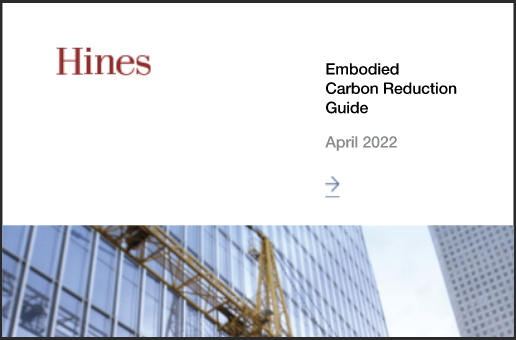Real estate management and investment firm Hines has released the Hines Embodied Carbon Reduction Guide.
The free guide, produced with Magnusson Klemencic Associates (MKA), is the result of a two-year effort, relying on MKA’s industry-leading knowledge of carbon accounting and involvement in programs such as the Embodied Carbon in Construction Calculator (EC3) Tool, according to a news release.
The “108-page program aims to create more sustainable development practices at Hines while establishing an industry standard for quantifying, tracking, and reducing embodied carbon in the commercial real estate development process,” the release says.
“By sharing the Embodied Carbon Reduction Guide with developers, engineers, contractors, material suppliers, investors, and other industry partners, Hines and MKA aim to affect lasting, responsible, and sustainable progress toward reducing the built environment’s carbon footprint,” the release says.
In a related developed, Hines says that its Salesforce Tower Chicago project, a 60-story, 1.2 million-sf office tower recently topped out. The firm says it is the first building to achieve a 19% overall reduction in carbon emissions by using the guide. Nineteen percent equates to a total verifiable structure carbon savings of over 7 million kilograms of C02, which equates to taking more than 1,500 cars off of the road for a year.
Related Stories
| Nov 10, 2011
California seismic codes spur flurry of hospital projects
New seismic requirements in California are helping to drive a flurry of new projects and retrofits in the state’s health care sector.
| Nov 10, 2011
Senate ready to repeal 3% withholding on government contracts
The U.S. Senate is set to approve legislation that would eliminate a law requiring federal, state, and local governments to withhold 3% of their payments to contractors and companies doing business with the government.
| Nov 10, 2011
New legislation aimed at improving energy efficiency in federal buildings
Recently introduced legislation, the “High-Performance Federal Buildings Act,” would help federal agencies save energy and money by improving building performance.
| Nov 4, 2011
CSI and ICC Evaluation Service agree to reference GreenFormat in ICC-ES Environmental Reports?
ICC-ES currently references CSI's MasterFormat and other formats in all of its evaluation reports. The MOU will add GreenFormat references.
| Nov 3, 2011
House Votes to Kill 3% Withholding Requirement; Senate Yet to Vote
The U.S. House of Representatives voted last week to repeal a 3% IRS withholding tax on businesses that do work for the government.
| Nov 3, 2011
OSHA Publishes Information on Rights and Safety
OSHA recently published new and revised information that explains workers’ and employers’ rights, as well as how to protect workers from hazards in the construction industry.
| Nov 3, 2011
Sierra Club Critical of Albuquerque Mayor’s Push to Weaken Green Code
The mayor’s plan to move to a less environmentally friendly code would mean confusion for people in the construction industry and a loss of energy efficiency and money for consumers, said Shrayas Jatkar of the Sierra Club.
| Nov 3, 2011
Lax Code Enforcement Blamed for Deaths in Turkey’s Earthquake
Despite tough safety codes approved a decade ago after earthquakes killed 18,000 people, lax enforcement led to hundreds of deaths after a recent earthquake in Turkey.
| Nov 3, 2011
International Green Construction Code Will Provide Template for Local Codes
A uniform code for green construction is being readied for publication in March.
| Oct 31, 2011
NIST issues new code requirements
Buildings taller than 420 feet are now required to include an extra exit stairwell or a specially designed elevator that occupants can use for evacuations.









